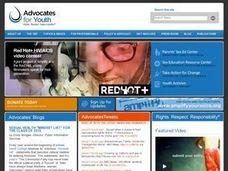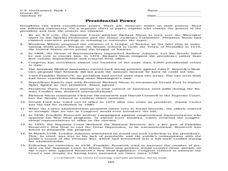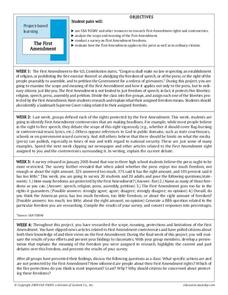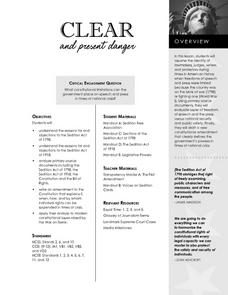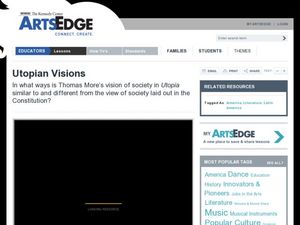Curated OER
Password
Students identify vocabulary words from the Bill of Rights and the Constitution. In this vocabulary lesson plan, students are given clues and say the word from the clues.
Curated OER
History Biographies
Students explore the life and the contributions of five people from U.S. history in the five lessons of this unit. james Madison, Dolly Madison, Sequoyah, Harriet Tubman, and Clara Barton are presented to students for exploration and...
Curated OER
We the People. . .
Students explore the United States Constitution. In this government lesson, students write newspaper editorials that reflect their opinions about Amendments.
Curated OER
History Mystery Message Challenge
Eleventh graders examine the US Constitution. In this American Government lesson, 11th graders gather the history and government facts to solve the history message.
Curated OER
The Bill of Rights: Debating the Amendments
Students interpret historical evidence presented in primary and secondary resources. In this Bill of Rights instructional activity, students research 12 possible amendments that were considered for the...
Curated OER
Checks on Presidential Power
Students examine presidential powers. In this checks and balances lesson, students identify the constitutional and informal restraints of the president and consider the reasons for the limitations.
Curated OER
America 2000: Federal Round Table Discussion
Eighth graders examine the United States Constitution and identify the beliefs and values Americans follow today. In groups, they compare and contrast state's rights and federal rights and the issues affecting them. They debate the...
Curated OER
The Bill of Rights
Students examine the intent Bill of Rights. In this American government lesson, students watch segments of the Discovery video "The Bill of Rights." Students discuss and debate the 4 Supreme Court cases featured in the video.
Curated OER
Ira Ritter, Et Al., V. Jerry And Ruth Stanton Lesson 2: What Does a Jury Do Anyway?
Students investigate how a jury is chosen, and what the rights and responsibilities of juries are. They examine case studies to determine the role of the jury in both criminal and civil cases.
Curated OER
Political Parties, Platforms, and Planks
Ninth graders examine the origins and functions of political parties. In this American Government lesson, 9th graders create a party platform to address political issues that are likely to arise during a national election. Students...
Curated OER
Election Baseball
Students play trivia baseball where they answer trivia questions about the Constitution and elections. In this social studies lesson plan, students research facts about the Constitution and elections while playing the game.
Curated OER
Checks and Balances Chart
In this checks and balances chart worksheet, students use their textbooks and a copy of the U.S. Constitution to complete 10 items in the chart identifying the branches of government.
Curated OER
Checks and Balances
Students take a closer look at the responsibilities of the Legislative, Judicial, and Executive branches. In this U.S. government lesson plan, students read articles 1, 2, and 3 of the Constitution and then use Venn diagrams to compare...
Curated OER
Supreme Court in Our Lives: Key Cases
Learners analyze Supreme Court decisions and their effect on students. They discuss current events realted to the U.S. Constitution and review cases that impact learners. They identify each case with its facts, issues, and arguments.
Curated OER
Dancing and Singing Through the Bill of Rights
Students study the Bill of Rights. In this Bill of Rights lesson, students read and analyze the Bill of Rights before performing The Amendment Song, and a dance associated with the concepts. They work in small groups using a Frayer...
Curated OER
The First Amendment
Eleventh graders examine the First Amendment. In this US Government lesson, 11th graders analyze the scope and meaning of the first amendment. Students conduct a survey on First Amendment freedoms. Student evaluate the First Amendment.
Curated OER
The Nonlegislative Powers
Eleventh graders examine the powers of Congress. In this American Government lesson, 11th graders read about Congress. Students complete a worksheet on their findings.
Curated OER
Voting Rights: Convicted Felons
Students explore the state right to revoke the voting privileges of convicted felons. In this voting rights lesson plan, students read an article and respond to discussion questions about the voting rights of felons.
Curated OER
Loyalists
Students explain why some colonists remained loyal to England during the American revolution. In this social studies activity, students write a letter to an editor about their reasons for remaining loyal to England.
Curated OER
Clear and Present Danger
Students assume identities of lawmakers, judges, writers, and protestors during times in American history when freedoms of speech and press were limited because country was on the brink of war or fighting one. Students use primary source...
Curated OER
Utopian Visions
Students examine Sir Thomas More's Utopian vision. In this philosophy lesson, students read Utopia and determine the pros and cons of Utopian societies. Students then create and present monologues of residents of the Utopia.
Curated OER
Religion in Public Schools
Students examine the presence of religion in public institutions. In this ethics lesson, students focus on one aspect of the presence of religion in public institutions, and the controversy surrounding religion in the public schools....
Curated OER
Racism: Law and Attitude
Students examine discrimination laws. In this racism lesson plan, students compare and contrast de facto and de jure discrimination. Students also explore the Bill of Rights and determine what makes some acts and speech illegal.
Curated OER
The Constitution and The Bill of Rights
Studnets learn about The Constitution and The Bill of Rights through a series on Internet pages that include such things as the framers, court cases and games.


